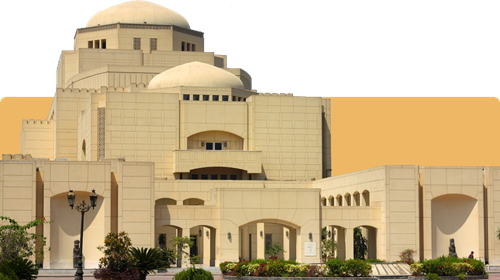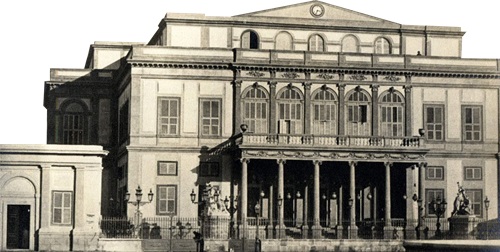
Prof. Dr. Alaa Abdel Salam
Born in 1973, in Kuwait, Alaa Abdel Salam received his Bachelor degree in cello performance from the Faculty of Music Education, Helwan University in 1996 with distinction. That same year, he was appointed as a teaching assistant at the Department of Performance. He studied the cello under numerous distinguished professors, most notably Professor Thomas Gomorri, a renowned cello instructor at the Tbilisi State Conservatoire in Georgia.
Abdel Salam obtained his Master’s in 2002 and his PhD in 2007, and was appointed to these academic positions consecutively until he became a Professor of Cello at the Department of Performance in 2022. Since 2022, he is also serving as a Visiting Professor at the American University in Cairo.
In 2009, Alaa Abdel Salam became Assistant Conductor of the Religious Song Ensemble, an esteemed ensemble specializing in Arab religious songs and music. That same year, he was assigned to conduct the Cairo Opera Celebration Orchestra for major religious events featuring renowned artists such as Mohamed Tharwat, Nadia Mostafa, Ihab Tawfiq, to count a few. These concerts were held at Egypt’s most prestigious venues, including the Cairo Opera House’s Main Hall and Sayed Darwish Theatre in Alexandria.
In addition, he was assigned to conduct orchestras for major national celebrations at all the avenues of the Cairo Opera House, including the centennial commemorations of President Gamal Abdel Nasser and President Anwar El Sadat, as well as the Sinai Liberation Day celebrations in Sharm El Sheikh, which was held in the presence of representatives from the Egyptian Presidency and high-ranking officials.
Since 2016, Alaa Abdel Salam has been the Principal Conductor and Artistic Director of the Religious Song Ensemble at the Cairo Opera House. This distinguished Ensemble is dedicated to preserve and present the rich legacy of traditional Arab religious songs and music.
Abdel Salam has conducted numerous special concerts dedicated to legendary Egyptian composers, including: Baligh Hamdy, Mohamed El Mogy and Mohamed Abdel Wahab. These concerts achieved great public acclaim and have been staged at the Cairo Opera House’s Main Hall, the Gomhouria Theatre, the historic Arab Music Institute “formerly King Fouad Institute”, as well as the Open-Air Theatre and the Fountain Theatre.
Moreover, he was conducted the closing concert of the Arab Music Academy Awards Ceremony, an event organized by the League of Arab States, as part of the Arab Music Festival and Conference.
In 2023, Alaa Abdel Salam was assigned as the Principal Conductor of the Alexandria Opera Ensemble for Music & Arab Singing. That same year, the whole Ensemble was invited to Kuwait to present a concert titled “A Night of Warda Al Jazairia” at the Sheikh Jaber Al Ahmad Cultural Centre.
As a cellist, he has performed with numerous orchestras under the baton of renowned Arab conductors such as Amir Abdel Meguid and Emad Ashour. He took part in performing over 60 soundtracks for Egyptian and Arab movies, and in more than 50 soundtracks for Egyptian TV drama series, solidifying his presence in the Arab music scene. Moreover, he has participated in international music festivals across Europe, performing alongside prominent Arab and European artists.
Notably, Alaa’s journey with the Cairo Opera House began in 1993 when he joined the Youth Orchestra as a cellist under the direction of Dr. Sayed Awad. Since 1995, as a cellist, he has been a core member of the musical ensembles accompanying Egypt and the Arab world’s most celebrated singers. In 2005, he was promoted to the position of Principal Cellist of the Arab music ensembles at the Cairo Opera House.
In 2019, Abdel Salam had supervised the production of an album featuring songs by Sayed Darwish, released the AUC’s centennial anniversary celebration. In 2024, he conducted a concert commemorating Umm Kulthum’s 50th Death Anniversary held at the Philharmonie de Paris in France.
With his profound contributions as a conductor, educator, and cellist, Alaa Abdel Salam continues to play a pivotal role in shaping Egypt’s musical landscape.
Currently, Alaa Abdel Salam is the Chairman of the “Cairo Opera House”.

Egypt has always been regarded as a cultural and geographical crucible of world civilizations. Gifted by its strategic location, it has consistently served as a beacon of art and a nucleus for cultural diffusion. Acknowledging the pioneering role of Egypt, Khedive Ismail gave instructions to build an Opera House, in 1869, to celebrate the inauguration of the Suez Canal. Known for his passion for culture and art, the Khedive planned to lay the foundation of an architectural masterpiece that rivals its counterparts in Europe. The Khedivial Opera House was constructed in only six months to the design of two Italian architects, Avoscani and Rossi. Outstanding specialists with wide experience in theatre construction were brought to Egypt to carry out the work. Before the building was complete, Khedive Ismail started to prepare a great performance for the opening of his project that should reflect glimpses of Ancient Egyptian history. He commissioned the Italian poet Antonio Ghislanzoni to write the libretto and Giuseppe Verdi to compose the music. The outcome was the famous opera, Aida, with its patriotic subject, passionate songs, and superb music: an operatic masterpiece. Unfortunately, because of delays caused by the Franco-Prussian war, the sets and costumes for the premiere of Aida could not be transported from Paris in time. Accordingly, Verdi’s Rigoletto was performed in the Khedivial Opera House’s official opening instead. Aida eventually premiered two years later, in 1871. The Khedivial Opera House was the first in Africa and the Middle East, where famous world operas and symphonic masterpieces were performed. Tragically, in the early morning hours of 28 October 1971, a fire burned down the building of the Khedivial Opera House leaving Cairo without a suitable operatic venue for nearly two decades. In March 1985, the first cornerstone of the new Opera House was laid. Egypt, with the support of the Japan International Cooperation Agency (JICA), decided to build a prestigious cultural edifice that shall become a hub of artistic activity in the region. After deciding on Gezira in central Cairo as the new location, careful planning by the Ministry of Culture and the JICA produced a design suggestive of traditional Islamic architecture which blends in harmoniously with the surrounding area. This cooperation was a significant gesture revealing the bonds of friendship between these two ancient countries. After 34 months of continuous hard work, the Cairo Opera House was officially inaugurated on the 10th of October 1988.
 The Egyptian Opera House, or the General Authority of the National Cultural Center, was opened in 1988 and is located in its new building, which was built by a grant from the Japanese government to its Egyptian counterpart on the land of Al-Jazeera in Cairo.the house was built in the Islamic style.
This great cultural edifice, which opened on October 10, 1988, is the alternative to the Khedive's Opera House, which was built by Khedive Ismail in 1869 and burned down on October 28, 1971 after remaining a cultural beacon for 102 years.
The history of the construction of the old opera house dates back to the period of prosperity witnessed by the era of Khedive Ismail in all fields. Khedive Ismail ordered the construction of the Khedivial Opera House in the Azbakeya neighborhood in central Cairo on the occasion of the opening of the Suez Canal, where he intended to invite a large number of kings and Queens of Europe. The opera was built in just six months after its design was developed by the Italian architects avoscani and Ross. Khedive Ismail's desire was for an Egyptian Opera to be opened by the Khedivial Opera House, an opera Aida, whose music was composed by the Italian musician Verdi, but circumstances prevented it from being presented at the time of the opening ceremony, so the opera Rigoletto was presented at the official opening, which was attended by Khedive Ismail, Empress Eugenie, wife of Napoleon III, King of Austria and crown prince of Prussia.
The Khedivial Opera House, which burned down at dawn on October 28, 1971, had a capacity of 850 people, and there was a place dedicated to important personalities and that house was characterized by grandeur and luxury.
The Egyptian Opera House, or the General Authority of the National Cultural Center, was opened in 1988 and is located in its new building, which was built by a grant from the Japanese government to its Egyptian counterpart on the land of Al-Jazeera in Cairo.the house was built in the Islamic style.
This great cultural edifice, which opened on October 10, 1988, is the alternative to the Khedive's Opera House, which was built by Khedive Ismail in 1869 and burned down on October 28, 1971 after remaining a cultural beacon for 102 years.
The history of the construction of the old opera house dates back to the period of prosperity witnessed by the era of Khedive Ismail in all fields. Khedive Ismail ordered the construction of the Khedivial Opera House in the Azbakeya neighborhood in central Cairo on the occasion of the opening of the Suez Canal, where he intended to invite a large number of kings and Queens of Europe. The opera was built in just six months after its design was developed by the Italian architects avoscani and Ross. Khedive Ismail's desire was for an Egyptian Opera to be opened by the Khedivial Opera House, an opera Aida, whose music was composed by the Italian musician Verdi, but circumstances prevented it from being presented at the time of the opening ceremony, so the opera Rigoletto was presented at the official opening, which was attended by Khedive Ismail, Empress Eugenie, wife of Napoleon III, King of Austria and crown prince of Prussia.
The Khedivial Opera House, which burned down at dawn on October 28, 1971, had a capacity of 850 people, and there was a place dedicated to important personalities and that house was characterized by grandeur and luxury.
